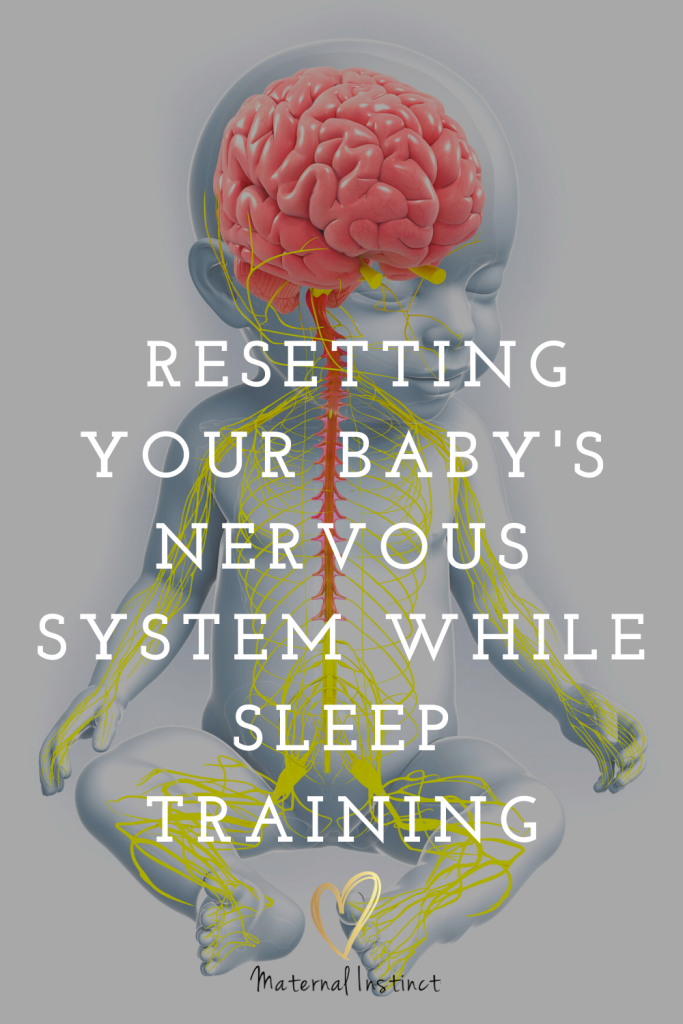Soothing Your Baby’s Nervous System: Supporting Your Newborn

When Your Baby’s Nervous System Needs a “Reset”
The witching hour….oh every parent relates to this sacred time of intense anxiety and fear. Every baby cries, just like every baby poops, but the more we know about the cry, the better we can handle it. Soothing your baby is as instinctual as feeding them, but let’s talk about how to understand why your baby is crying. Once you have eliminated the possible upsetting scenarios of a dirty diaper, hungry or sleepy baby, you can dig deeper into understanding the nervous system to support your baby during times of unknown distress.
The Biology of Baby’s Nervous System
A baby’s nervous system takes up to three years to develop enough for them to be able to reset them on their own. Therefore, babies will need help to reset their systems for the first three years of their lives. Resetting your baby’s nervous system will be one of the most important parts of your job as a parent. Babies have the least control over this system, and parents have the most control in helping them with it.
We have often heard of the nervous system being described in two parts: the sympathetic nervous system (SNS) “fight or flight” and the parasympathetic nervous system (PNS) “rest and digest.” More recently, experts have identified the social behavior nervous system which relates more to infants and is activated when learning from watching you and absorbing information from their environment with social communication.
When soothing your baby, you will sound and act in a certain way, such as singing to your baby, rocking, using deep breathing, etc. Typically, this is what you are doing to calm yourself as well. These actions help your baby associate certain behaviors with calm, so think about what those are and use often (a same song?) so your baby recognizes when it’s safe to relax.
Ways to Support Soothing Your Baby
The reason we bring a baby into our arms to soothe them is because physical touch will bring your baby to a calm place, helping them to stop crying. It is an evolutionary biology that helps babies survive. They often need to reconnect with their care provider throughout the day to help keep them calm and reassured of safety.
Bringing your baby to your chest and breathing deeply will bring down your cortisol levels as well as your baby’s.
You can really change your baby’s mood and demeanor by resetting the nervous system, which will, in turn, make both yours and your baby’s lives easier. To do so, bring your baby to your chest, put a hand flat on the head, and engage in deep breathing. It is important that you do not make any noise and don’t move. Just remain calm and focus on the stillness and breathing of both you and your baby. This should reset your baby’s nervous system. Do this, at the very least, once a day.
Try to reset your baby’s nervous system multiple times through the day. This is because cortisol levels (stress) build up, and your baby will become overstimulated. Note however, that the system will eventually reset by accident or without you being aware that resetting has occurred. This usually happens when you are both crying at the same time while you hold your baby to your chest. Or it could happen while you are breastfeeding your baby. However, the more aware of it you are and the more often you do it, the more in control of the situation you will be, and the happier and more agreeable your baby will be.
And, when you practice these deep breathing and calming techniques, you’ll notice your stress levels go down too.
[elfsight_youtube_gallery id=”4″]
About Maternal Instincts
We are a full-service nanny, overnight care and postnatal doula concierge company. We also offer nannies for corporate events and travel nannies. Our nannies are licensed and certified in their fields. Every family is matched “old-school” through in-person interviews, a home visit and a proper screening of our nannies’ personality types and approaches for a perfect fit. Set up a 15-minute information call easily through our online reservation center. Start now…

